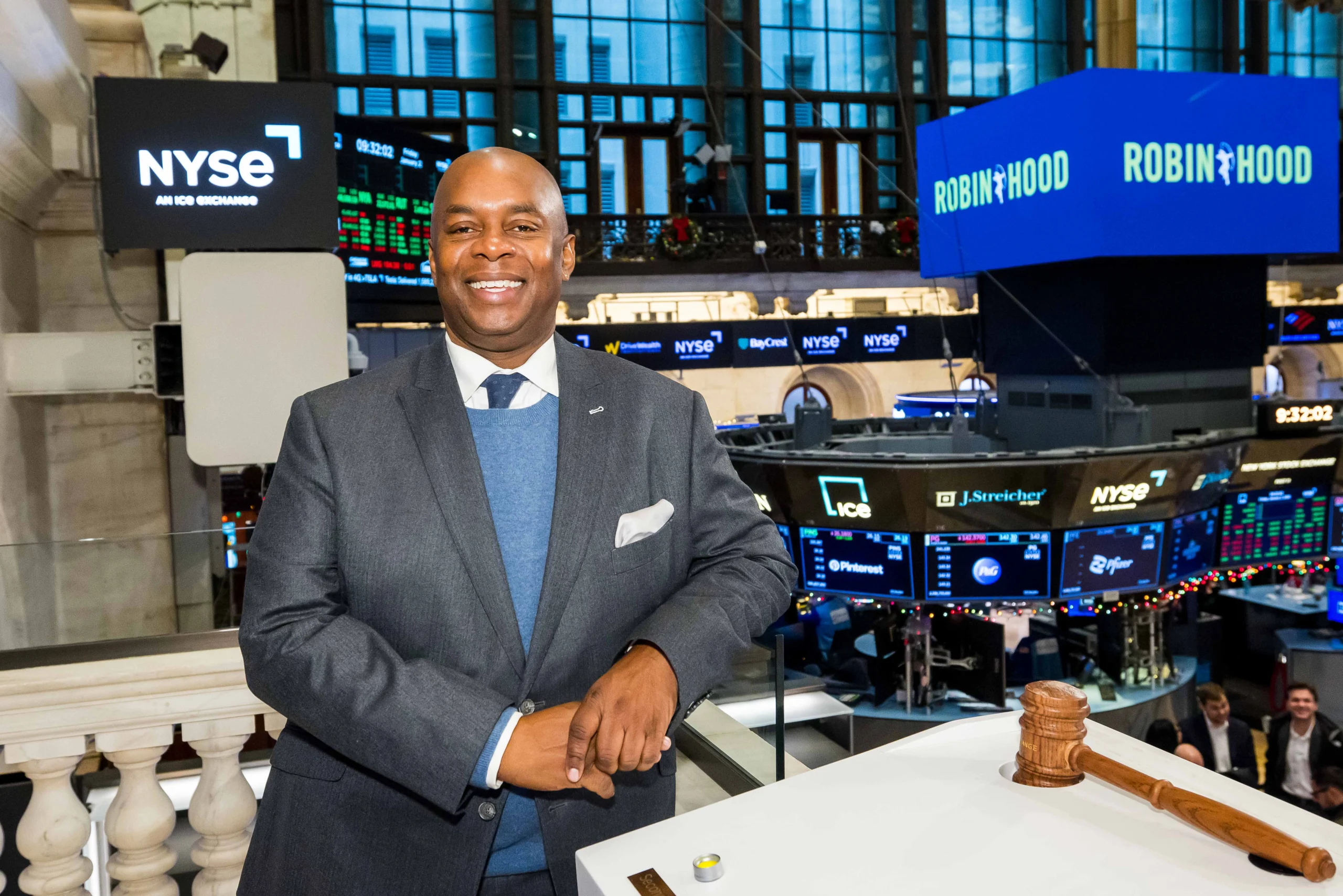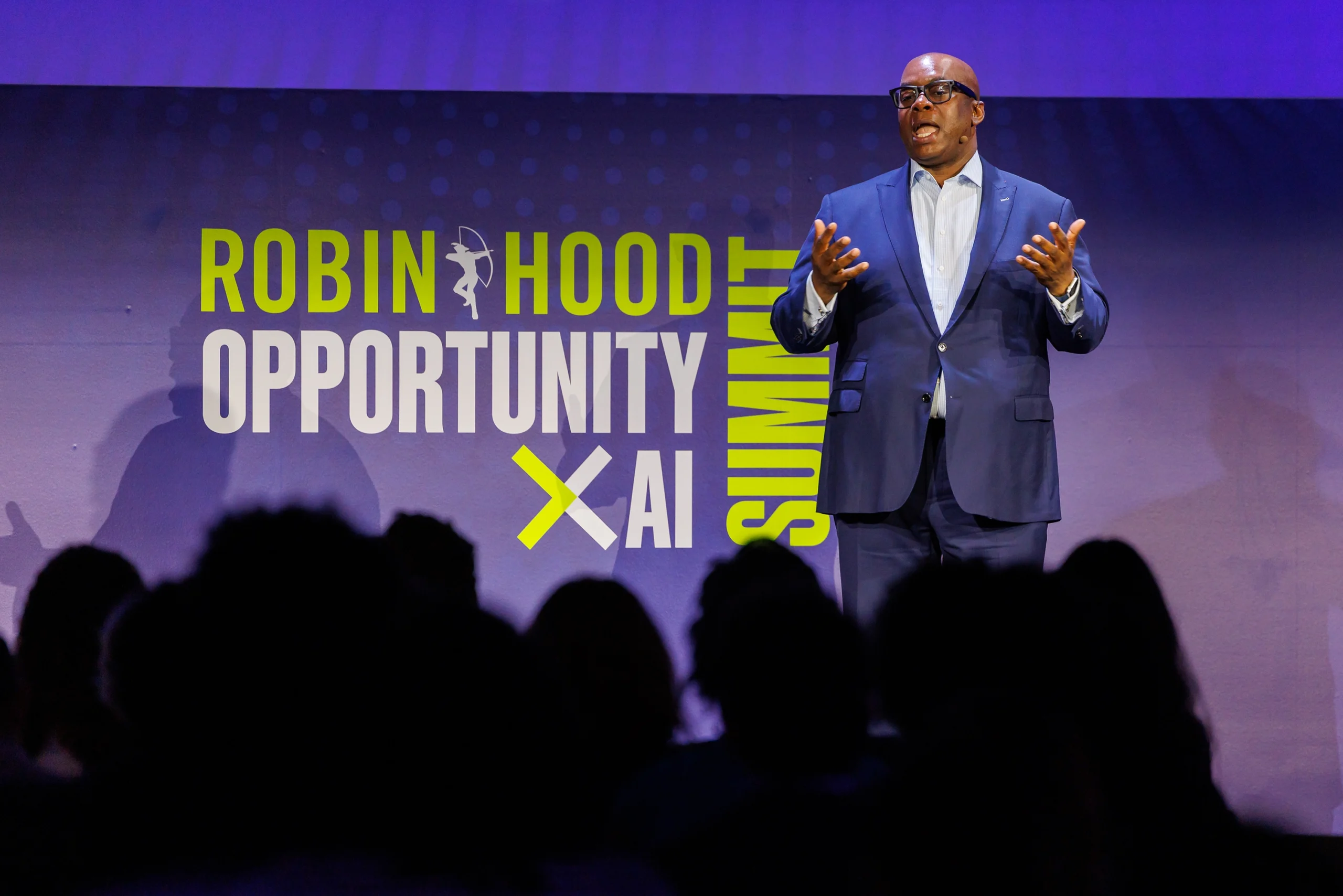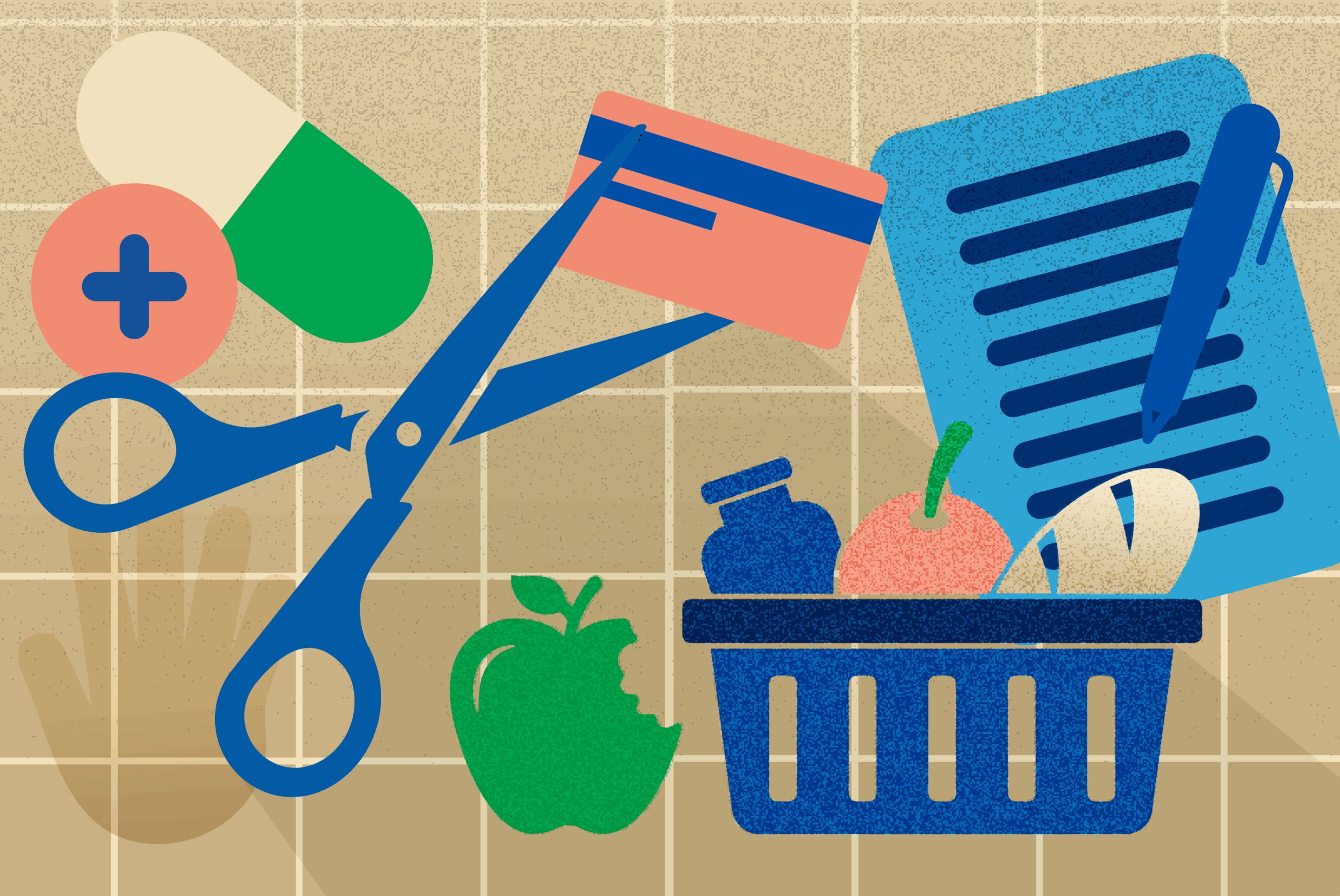Sep 16, 2024 Press Release
Nine Finalists Advance in Pursuit of Up to $4 Million in Awards Conferred Through Robin Hood’s AI Poverty Challenge
Tech finalists representing California, Missouri, New York, and Washington, D.C., emerged from a national competition announced earlier this year to promote the use of AI as a tool to combat poverty by fueling opportunity. Each finalist receives $100,000 and will compete for the Challenge’s crowning achievement – three $1 million awards across three categories.
NEW YORK, NY – September 16, 2024 – Robin Hood today announced nine organizations from three states and the District of Columbia have moved into the finalist stage of its AI Poverty Challenge, a national competition to advance effective, responsible, and equitable uses of machine learning and artificial intelligence. The nine finalists emerge from a pool of nearly 200 applicants across 21 states. Each finalist receives a $100,000 award and an opportunity to further compete for one of three winning spots of $1 million each in the focus areas of Education, Workforce, and Financial Empowerment.
The Challenge is made possible through a partnership with the GitLab Foundation, the Bezos Family Foundation, and Deloitte. It was originally announced by Paul Tudor Jones II, Robin Hood’s founder, and Alexis Ohanian, a Robin Hood board member at its February 2024 Robin Hood Opportunity x AI Summit.
“There is no question that AI is fundamentally transforming our world. But it is still an open question whether those changes will benefit or further burden those who are already excluded from economic opportunity. And too few of the organizations and leaders on the frontlines of fighting poverty are well-positioned to influence how AI is developed or to harness its potential. That’s why we launched the AI Poverty Challenge.” said Richard R. Buery, Jr. CEO of Robin Hood. “This Challenge represents a new frontier of hope as we explore how machine learning and the AI revolution can be a force fueling upward mobility. Our finalists have been through a rigorous scoring and review process administered by a panel of 100 judges selected for their areas of expertise, including people who have experienced poverty and those who support them. We are excited to see how the work of the finalists evolves in the months and years to come.”
During the Winter of 2024/25, these finalists will be evaluated on their progress toward actualizing their vision for viable, transformative, and sustainable AI-based solutions to poverty. From this pool, three winners will be selected to receive the final awards of $1 million each.
For complete details visit the Challenge’s website at aipovertychallenge.org
AI Poverty Challenge Finalists include:
In the Category of Education:
Beyond 12 (California)
A Gen AI College Success Coach to Increase Economic Mobility
Beyond 12 is designing and launching a Gen-AI-powered college success coach to serve millions of historically underserved college students annually. To reduce the college degree divide between students in the bottom income quartile and their wealthier peers, Beyond 12 is developing a personalized, evidence-based, and culturally inclusive GenAI-powered Coach to provide success coaching at scale to college students from under-resourced communities. Using AI, Beyond 12 is scaling its proven coaching model to ensure all historically underserved college students have the opportunity to earn post-secondary degrees that allow them to break cycles of poverty and lead choice-filled lives.
“We are honored and thrilled to partner with Robin Hood, the GitLab Foundation, and the Bezos Family Foundation to launch our GenAI-powered success coach to support millions of historically underserved college students. Ultimately, this investment will allow us to use the power of AI to ensure all students have the opportunity to earn post-secondary degrees that allow them to provide for their families, contribute to society, and break cycles of generational poverty,” said Alexandra Bernadotte Founder and CEO of Beyond 12.
Paloma Learning (California)
Harnessing AI to unleash marginalized parents’ untapped teaching potential
Paloma’s app enables marginalized families to build a habit of tutoring their kids for 15 daily minutes. This transforms student learning outcomes and family efficacy. Research shows families—not schools—primarily determine academic outcomes. Nonetheless, districts have historically sidestepped families and focused narrowly on classrooms (where kids spend <13% of waking hours). Paloma helps Title I districts dramatically accelerate student learning by unleashing parents’ untapped teaching potential. By helping parents tutor their kids daily, Paloma unlocks a world of instructional time that otherwise lays dormant in every school community. As one superintendent put it, “Paloma awakens the sleeping giant of parents as tutors.”
“We’re humbled to be in such esteemed company, and we’re grateful for Robin Hood’s support. Title I districts across the country need to ramp up instructional time to accelerate learning recovery, but teachers are stretched thin and budgets are shrinking. Paloma can help solve this quandary by enabling marginalized parents to build a daily habit of delivering rigorous, curriculum-aligned, and joyful learning experiences at home,” said Alejandro Gibes de Gac, CEO & Co-Founder of Paloma Learning.
Teaching Lab (Washington, D.C.)
Leveraging AI to Improve Student Literacy and Optimize Teacher Time
Teaching Lab and its partners, Coursemojo and Magpie, will use AI-powered tutoring and curriculum-aligned teacher tools to dramatically improve student literacy outcomes, increase teacher effectiveness, and disrupt generational poverty. Learning to read is one of the most powerful anti-poverty tools. AI solutions, built based on the Science of Reading and high-quality curriculum, hold great promise to improve student literacy outcomes. The team’s transformational approach includes: 1) Magpie’s AI-enhanced First Foundations to build all literacy subskills; 2) Coursemojo’s AI-powered assistant teacher to build comprehension and writing skills; and 3) Teaching Lab’s coaching and professional learning to ensure teachers and product designers effectively implement for impact.
“Learning to read is one of the most powerful anti-poverty tools. Generative AI solutions, based on the science of reading and high-quality curriculum, hold great promise to improve student literacy outcomes. Teaching Lab is excited for the opportunity to partner with Coursemojo and Magpie to provide tech-enabled and curriculum-aligned supports, improve and increase teachers’ feedback to students, and use real-time data to maximize teachers’ time and increase their effectiveness. And we’re beyond grateful to the Robin Hood Foundation for organizing this competition to leverage AI to improve student outcomes nationwide,” said Teaching Lab CEO Sarah Johnson.
In the Category of Financial Empowerment:
The Legal Aid Society (New York)
AI with a Human Touch: Streamlining Helpline Services
The Legal Aid Society’s (LAS) AI-powered Housing Helpline Information Retrieval Tool aids attorneys and paralegals by swiftly summarizing vetted information, allowing faster hotline response times, increasing the number of people who can be served, and improving client satisfaction while maintaining human connection and quality control. Developed with Columbia University, the Tool operates in a closed secure ecosystem, using vetted materials to help staff promptly find and summarize information. The solution leverages LAS’ expertise as NYC’s largest and oldest legal service and will enhance the team’s ability to drive systemic change through informed advocacy and policy reform.
“We are honored to be named as a finalist in Robin Hood’s AI Poverty Challenge for our innovative AI approach to helping thousands of low-income New Yorkers annually through our Housing Justice Helpline,” said Adriene Holder, chief attorney of the Civil Practice at The Legal Aid Society. “This grant will be instrumental as we develop and scale similar AI-powered tools to serve our clients facing issues not only in housing, but immigration, employment, government benefits, and more.”
Nava Public Benefit Corporation (Washington, D.C.)
Helping the Helpers: Chatbots Helping Staff Navigate Benefits Programs
Nava is developing an AI-powered assistive chatbot to help staff efficiently connect people in poverty to public benefits programs. The social safety net provides a lifeline for people experiencing poverty—but navigating and enrolling in public benefits programs is challenging. Many people need help from staff like case workers and call center specialists. Nava is researching, prototyping, and piloting generative-AI-enabled tools to support these staff. One particular opportunity that Nava has uncovered is creating an assistive chatbot that can answer questions while a staff member is on the phone with someone—helping them quickly research and interpret complex program requirements.
Upsolve (New York)
Upsolve: The Financial Assistant for Low-income Americans
Upsolve is an AI-powered Financial Counselor that helps low-income Americans reduce debt and improve credit at scale through personalized recommendations, back-and-forth conversation, and automated execution. Upsolve Assist helps users understand the best ways to reduce their debt and increase their credit score and then, wherever possible, helps them do it for free. Upsolve Assist’s bankruptcy module has already been used by 14,200 low-income families to erase over $600 million in debt.
“We’re thrilled to be in the finals of Robin Hood’s AI Poverty Challenge, after being incubated in Blue Ridge Labs @ Robin Hood eight years ago,” said Upsolve Co-Founder & CEO, Jonathan Petts. “With Robin Hood’s support, we hope to leverage AI to help low-income Americans overcome debt and rebuild credit at scale.”
In the Category of Workforce:
CodePath (California)
Transforming Tech Education and Employment Outcomes for Underrepresented College Students
CodePath will use AI to personalize learning content to enable all students – regardless of background or university – to thrive in computer science programs. This solution transforms industry-oriented tech education for underrepresented college students. Today, CodePath’s proprietary learning management platform manages course logistics and allows instructors to choose content modules appropriate for their students. CodePath is designing context-aware AI tutors to support students’ personalized learning progression. The AI Tutor will incorporate course content and continuous evaluations of students to provide relevant, personalized support. This enables a wider range of students to master the curriculum and prepare for upwardly mobile tech careers.
“We’re honored to be a finalist in Robin Hood’s AI Poverty Challenge as we continue to transform tech education for underserved college students,” said Chris Coleman, Chief Product Officer at CodePath. “With Robin Hood’s support, CodePath is leveraging AI to personalize learning content and courses that will enable a broader population of students to master our computer science curriculum, allowing us to achieve new levels of industry readiness for our graduates and preparing them for upwardly-mobile careers in tech.”
FutureFit AI (New York)
AI-Enabled Workforce Services: Connecting Workforce and Social Supports
FutureFit AI and the Chinese-American Planning Council will offer an AI-powered one-stop solution that centralizes wraparound services and better connects job seekers to training and employment. The comprehensive AI-powered workforce development platform will help the Chinese-American Planning Council to more effectively connect job seekers to resources, training, and employment while streamlining staff workflows. By better integrating important elements of a fragmented ecosystem, FutureFitAI can ensure that more people obtain high-quality training and jobs that lift them into family-supporting wages.
“FutureFit AI and our partners at the Chinese-American Planning Council (CPC) are honored to be selected as finalists for the Robin Hood AI Poverty Challenge. With this support, we will deploy our AI-powered platform to better connect CPC’s diverse community of job seekers to crucial in-house and partner-provided workforce services and wraparound supports across New York City” said Priya Ramanathan, Head of Partnerships at FutureFit AI. “With a focus on the city’s Asian, immigrant, and low-income communities, our accessible, multi-language platform can directly confront language and service delivery barriers and help job seekers and the staff that support them in navigating pathways to economic mobility.”
Unlocked Labs (Missouri)
Unlocking Opportunity: AI to Empower Incarcerated Learners
UnlockEd, a service provided by Unlocked Labs, leverages AI to empower justice-involved individuals with transformative education and workforce readiness, breaking cycles of poverty and incarceration. By integrating AI-driven tutoring and learner guidance, the solution equips participants with essential skills and credentials, fostering economic mobility and reducing recidivism. UnlockEd’s scalable platform, developed in collaboration with correctional facilities and educational partners, ensures ethical AI use and meaningful community engagement, paving the way for broad societal impact and sustainable reentry outcomes.)
###
About Robin Hood
Last year, Robin Hood celebrated its 35th year of funding, supporting, and connecting New York’s most impactful community organizations at the forefront in the battle against poverty. We are NYC’s largest local poverty-fighting philanthropy and since 1988, we have invested nearly $3 billion to elevate and fuel the permanent escape of New Yorkers from poverty. In 2023, through grantmaking with 250+ community partners, we created pathways to opportunities out of poverty through our strategic partnerships on childcare, child poverty, jobs, and living wages, we are scaling impact at a population level for the more than 1.5 million New Yorkers living in poverty. At Robin Hood, we believe your starting point in life should not define where you end up. To learn more about our work and impact, follow us on X @RobinHoodNYC or go to robinhood.org.
MEDIA CONTACT
Kevin Thompson, Managing Director of Communications, Robin Hood
press@robinhood.org



